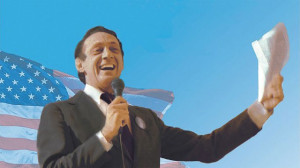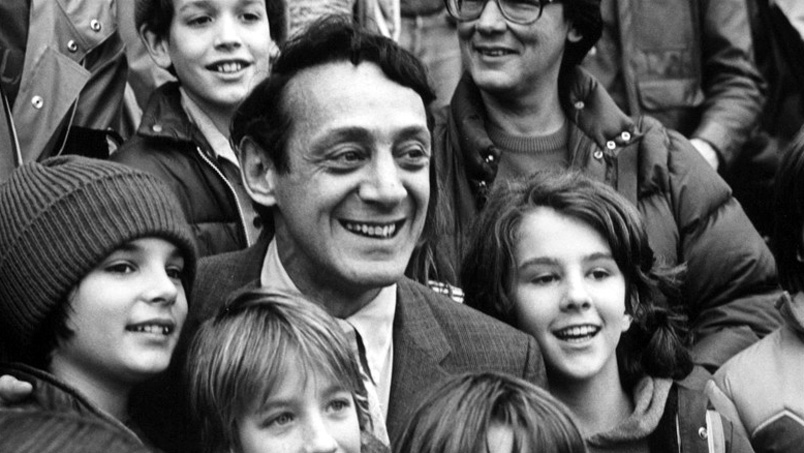A female colleague, a future U.S. senator, called to the murderer. He told her, “I have something to do first.” After luring our hero into his office, he shot him with all five bullets, the last two to the head.
Police quickly apprehend the assailant and he stands trial for murder — an open and shut case. But when the prosecution plays the confession in court, jury members wipe away tears. The verdict: voluntary manslaughter. Gays riot in the streets. The murderer serves five — count ’em five — years and is then released. Two years later, he commits suicide.
You know this tale by now. You can fill in the names — Harvey Milk, Dan White, George Moscone, Dianne Feinstein — without much effort. It’s a terrific plot, really, and if it were only fictional, we could leave it at that. But when you see the documentary The Times of Harvey Milk, the spellbinding nature of the narrative plays second fiddle to the rage, shock, despair, and, ultimately, hope it evokes.
I first saw the film a couple of years after its 1984 release, when I’d never before heard the words “gay” and “civil rights” in the same sentence. Back then, the F-slur fazed me hardly at all; in the schoolyard, it had been almost de rigueur to seize on the slur when you wanted to casually demean someone for anything suspect: a pink shirt, say; or the wrong kind of sneakers. The Times of Harvey Milk slapped me into another reality, one where an entire class of people struggled for fundamental rights. As a young man, I had been unable to make the connection between those schoolyard taunts and basic human dignity.
So I consider Rob Epstein‘s movie, winner of the Academy Award for best documentary, one of the more important events in my personal development as a human being. It still stands as a testament to how certain films can act as an antidote to the brutal dismissal of fellow humans. In telling Milk’s story, the filmmakers unerringly curate the wealth of available historical material, drawing on media news reports, photos, newspapers, and interviews. They also make use of wonderful footage of what was then called the Gay Freedom Day Parade, and more from Milk’s district, with the time-defying Castro Theatre looking like the same architectural gateway to the neighborhood it does today. Harvey Fierstein fills in the gaps with narration.
The film has an as-it-happened quality — you’ll hear a tape recording Milk made (below) to be played in the event of his assassination; a police transmission the night of the murders that “Harvey Milk and the mayor are supposed to be DOA;” footage of White being led away in handcuffs, and his tearful confession to police; plus an incredible interview with White’s wife in which she calmly asserts there’s “something for us good that can come out of this.” And most notably, the film opens with then-San Francisco Supervisor Dianne Feinstein, looking like she might faint, announcing Moscone and Milk have been shot dead, followed by pandemonium. “The suspect,” she continues, pausing slightly in disbelief, “is Supervisor Dan White.” Finally, we see a covered corpse wheeled out of City Hall. San Francisco politician Tom Ammiano, a schoolteacher and Milk associate at the time, breaks into tears describing his arrival at the scene just as the bodies were removed. (“I never knew Harvey had such big feet,” he recalls thinking.)
Other Milk cohorts give powerful testimonials as well, both at the time of events and in retrospect. During the violence that erupted after the Dan White verdict, Supervisor Harry Britt, Milk’s successor, lambastes the jury: “They were saying that the spirit of Dan White, with all of its pettiness, all of its meanness, all of its violence right below the surface is okay.” There is a beautiful sequence showing the reaction by the LGBT community to news of the assassination: thousands of people marching silently through San Francisco holding candles. Says San Francisco State professor Sally Miller Gearhart: “It was one of the most eloquent expressions of a community response to violence I’ve ever seen.”
Some critics have faulted the filmmakers for creating a hagiography. And if you want to fault the documentary for taking liberties, it does erroneously promulgate the idea that White’s lawyers employed the “Twinkie defense,” the notion that eating too much junk food contributed to his “diminished capacity.” But that Milk took a giant leap in the nation’s slow and still-evolving march toward LGBT equality is indisputable. Says his campaign manager, Anne Kronenberg, in a clip deleted from the final cut, “It doesn’t really matter how accurate or honest the legend about Harvey is. We have something to hold onto as a community.” Says another interviewee: “Before Harvey Milk there was never anyone who was openly gay who any of us could look up to or have as a role model. You grew up, isolated and alone in your own little community, being the thing that everybody didn’t want to be, and was the worst thing you could be, according to your peers in the church and the society and your parents.”
So While Sean Penn makes for a fine Harvey Milk in Gus Van Sant’s biopic, even that gifted an actor can’t project the same power and presence of the person he mimics. It’s quite something to hear this piece of Milk rhetoric, cadence and message perfectly pitched to work the crowd:
“Every gay person must come out. As difficult as it is, you must tell your immediate family, you must tell your relatives, you must tell your friends, if indeed they are your friends, you must tell your neighbors, you must tell the people you work with, you must tell the people in the stores you shop in. Once they realize that we are indeed their children — that we are indeed everywhere — every myth, every lie, every innuendo will be destroyed once and for all. And once you do, you will feel so much better.”
The Times of Harvey Milk is a fascinating and enormously moving look at a man and a movement, and at an important era in both San Francisco and LGBT history. It also serves as a reminder of just how far the cause of LGBT rights has come. For instance, a TV news reporter blithely prefaces a question to Milk with, “Some straights are concerned maybe the gays are taking over San Francisco.” At a KQED debate over Proposition 6, with Milk and Gearhart facing off against State Senator Briggs, Briggs claims the banishment of gay teachers would cut down on child molestation. Milk informs him the data shows no correlation between that category of crime and sexual orientation. Briggs insists: “We should cut out the homosexual group” to lessen the odds. This prompts Milk to laugh; he is genuinely amused at the man’s tortured math in the service of bigotry.
That blend of common sense and personality during Milk’s just 11-month tenure as an elected official won over many doubters. Jim Elliot, a union leader at the time, acknowledges his homophobia before meeting Milk, whom he calls a “great man” in the film. In the alternate ending, included on the DVD, Elliot describes his reaction when his own daughter came out to him as a lesbian. “She started to cry, my wife is crying, and the world had come to an end. I said, well, so what? Nothing to cry about. You’re gay, you’re gay. That’s it.”



